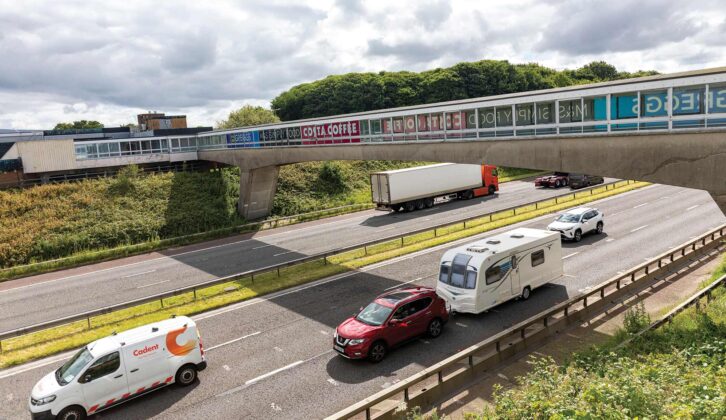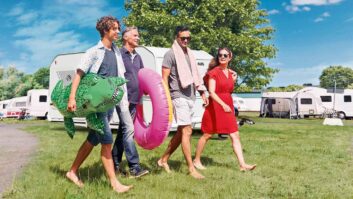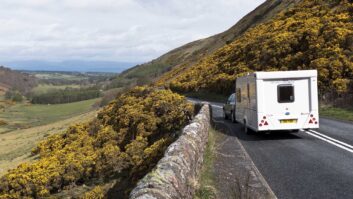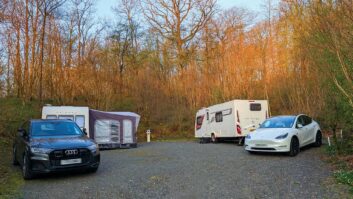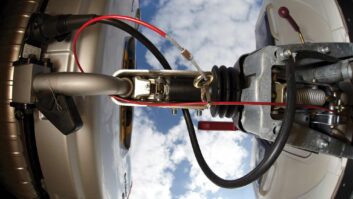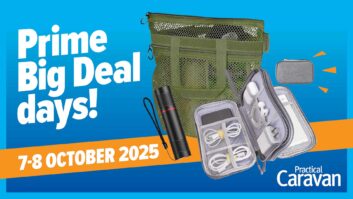Towing isn’t difficult, but it can certainly seem unfamiliar to start with.
Many years of regular driving don’t necessarily prepare you well for towing a caravan for the first time, and even those of us who are more experienced aren’t immune to making caravanning mistakes.
Errors can be made before a wheel is even turned, as well as during the drive itself. Here, I’m sharing five of the most commonly seen towing mistakes, and how to avoid them.
Practical Caravan is supported by its audience. When you purchase through links on our site, we may earn an affiliate commission. Learn more.
1 Overloading
At the most obvious level, overloading is adding too much weight when you are loading your caravan. Every tourer has a payload, which is the difference between its Mass in Running Order (MiRO) and Maximum Technically Permissible Laden Mass (MTPLM). Exceed the MTPLM, and the van is overloaded.
This, of course, is to assume that car and caravan have been sensibly matched.
As most readers will know, the widely accepted guideline for stable towing is that the loaded weight of the caravan should be no more than 85% of the car’s kerbweight.
Being poorly loaded can be as bad as weighing too much. Heavy items should be low down and close to the axle, never high up or at either end of the caravan.
It’s possible to overload the car’s towbar, as well as overloading the caravan. A maximum download of 75kg or slightly more is typical for a family car, while a large SUV might have a limit of 140kg or so.
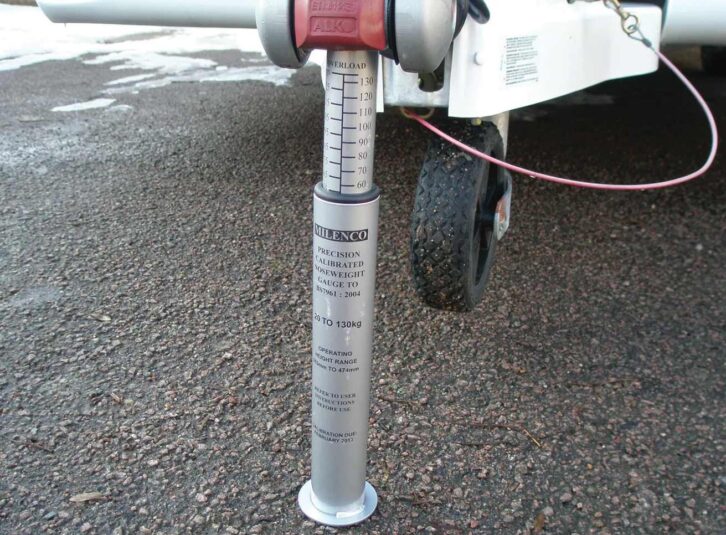
The maximum download, or noseweight, varies considerably from model to model. You can check the correct noseweight for your vehicle in the owner’s handbook or at an online database such as Towsafe.
So, how do you make sure you haven’t exceeded the maximum download?
This is where a noseweight gauge comes in handy; it can be a real caravan essential. With the caravan parked on level ground and loaded as if you were about to set off, the gauge fits under the hitch.
Ideally, 5-7% of the caravan’s loaded weight should be pressing down on the towbar, so long as this is within your vehicle’s noseweight limit.
You can buy a noseweight gauge from your local caravan dealer or accessory shop.
2 Exceeding speed limits
Even the best tow cars will accelerate more slowly while towing a tourer than it does in regular driving, so on the face of it, you will be less likely to break the speed limit while towing. But it’s not that simple.
Although car and caravan take longer to get up to speed than a car on its own, it is important to remember that on some roads, there are different speed limits when towing a caravan.
Instead of the 70mph limit on motorways and dual-carriageway A-roads, cars towing a caravan or trailer are restricted to 60mph.
On a single-carriageway road with a 60mph limit for cars, you mustn’t exceed 50mph while towing a caravan.
Of course, you don’t need any special towing gadgets to stay safely within the speed limit – a careful eye on road signs and the speedometer will do the job.
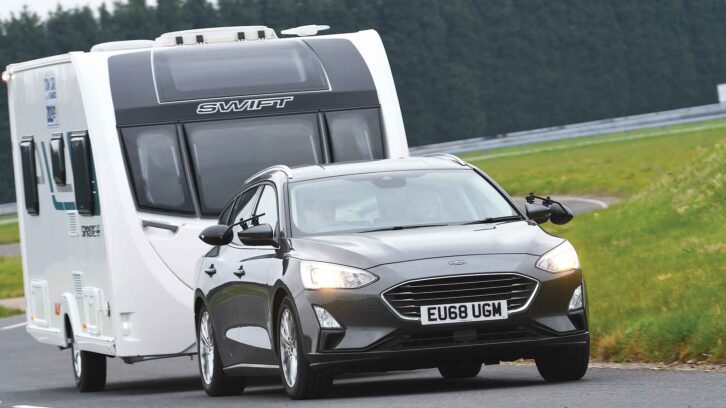
However, for an extra reminder, many cars have a speed limit warning function.
Some sophisticated modern systems will read road signs and sound a warning if you drive above the limit. However, most of these default to the limit applied to cars in normal driving. As we’ve explained, on many roads, this is going to be too high for a car and caravan.
Some cars allow the driver to set a manual speed limit warning. On a long motorway journey, you can set it to 60mph to be informed if you are creeping over the towing speed limit.
Alternatively, speed camera warning systems sometimes have large displays that show speed in bigger type than conventional speedometers.
3 Failing to secure your caravan
You can count yourself very unlucky if your tourer is stolen while you are staying at a campsite with good security. However, if you prefer to stop at small farm campsites, then security might not be as rigorous.
Being in a remote spot with few people around can make for a very relaxing holiday, but it could also leave your tourer vulnerable to theft if you don’t keep it as secure as you possibly can.
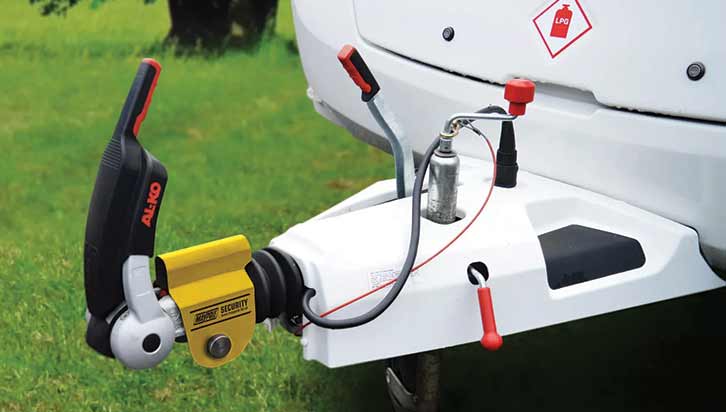
If you are towing with an electric car, you may need to leave your caravan mid-journey in order to recharge your EV.
Either way, it makes good sense to use at least one security device, or better still, more than one. The best caravan wheel lock and the best caravan hitch lock make a really good combination.
4 Underinflated or faulty tyres
Whenever you come across the remains of a shredded tyre on the hard shoulder, you can bet that a faulty or worn-out tyre has gone undetected until it was simply too late.
It’s impossible to overstate the importance of tyres to safe driving in all circumstances, including towing. Turning, accelerating and braking all depend on those four patches of rubber in contact with the road.
Before you set off on any towing trip, always check that your car and caravan tyres are inflated to the correct pressures. In the case of your car tyres, the correct pressure for towing may be higher than in normal driving.
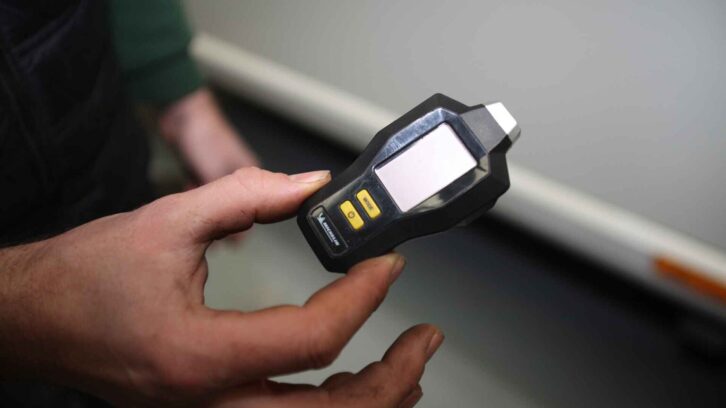
You should also check that the tyres are free from cuts and bulges and that there is plenty of tread left.
There must be at least 1.6mm of tread around the whole tyre, across the central three-quarters of the tyre.
The rough-and-ready way to check is to insert a 20p coin in the tread. If the outer band disappears, there’s enough tread left. If you can see the outer band, it’s time to think about replacing the tyre.
To obtain a more accurate reading, a tyre tread depth gauge is always going to be money well spent. You can pick one up for less than £10.
Don’t forget to carry out some caravan tyre care too, to ensure your tourer’s rubber stays in tip-top condition.
5 Faulty lights
From the very first time that I towed a caravan, it was drummed into me to carry out a lights check before every journey.
That’s all well and good, but what are you going to do if a bulb has failed?
It pays to have a spare set of bulbs with you on any journey. That could make the difference between a short delay and a long wait before you can begin your holiday. Again, spare bulbs are very cheap, so there’s no reason not to keep a set in your glovebox.
Something else worth knowing about is caravan towing electrics; they’re a crucial link between your tourer and tow car.
Lead image: Alamy Stock Photo
Future Publishing Limited, the publisher of Practical Caravan, provides the information in this article in good faith and makes no representation as to its completeness or accuracy. Individuals carrying out the instructions do so at their own risk and must exercise their independent judgement in determining the appropriateness of the advice to their circumstances and skill level. To the fullest extent permitted by law, neither Future nor its employees or agents shall have any liability in connection with the use of this information.
If you enjoyed reading this article, why not get the latest news, reviews and features delivered to your door or inbox every month? Take advantage of our brilliant Practical Caravan SUBSCRIBERS’ OFFER and SIGN UP TO OUR NEWSLETTER for regular weekly updates on all things caravan related.
